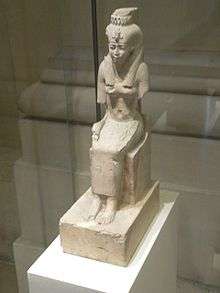Raet-Tawy
| Raet / Raet-Tawy | ||||||||
|---|---|---|---|---|---|---|---|---|
| Female aspect of Ra | ||||||||
 A statue of Raet. | ||||||||
| Name in hieroglyphs |
| |||||||
| Major cult center | Medamud, el Tod, Thebes | |||||||
| Consort | Montu | |||||||
Raet (rˁỉ.t) or Raet-Tawy (rˁỉ.t-t3.wỉ) is an ancient Egyptian solar goddess, the female aspect of Ra. Her name is simply the female form of Ra's name; the longer name Raet-Tawy means "Raet of the Two Lands" (Upper Egypt and Lower Egypt).
Origins
First appears during the reign of the Fifth Dynasty, Raet is likely to have been a companion of Ra from the start, and did not have a separate origin. Although she was called the lady of the sky and the gods, she never reached the importance of Hathor, who was also considered the wife of Ra (or, in other myths, his daughter).[1]
Cult
Raet was also considered a wife of Montu,[2] and she formed a triad with him and Harpocrates in Karnak and Medamud. Her feast day was in the fourth month of the reaping season.[1] The centers of her cult were at Medamud, El-Tod, and Thebes. A demotic manual from the Roman period with hymns to Raet has survived in fragments.[3]
Iconography
Images of Raet are rare. When she is depicted, she is shown as a woman with cow horns holding a sun disk on her head, similar to the headdress of Hathor. The headdress is adorned with a uraeus or with feathers.[1]
See also
References
- 1 2 3 Richard Wilkinson: The Complete Gods and Goddesses of Ancient Egypt. London, Thames and Hudson, 2003. ISBN 978-0500051207 p.164
- ↑ Wörterbuch, p.402
- ↑ Kockelmann, Holger (2003). "A Roman Period Demotic Manual of Hymns to Rattawy and other Deities (P. Ashm. 1984.76)". The Journal of Egyptian Archaeology. 89.
External links
| Wikimedia Commons has media related to Statues of Rattawy. |